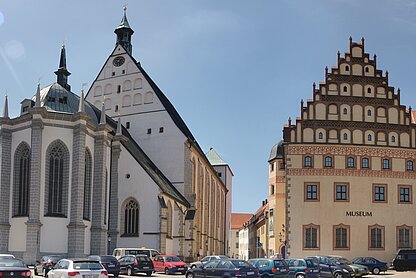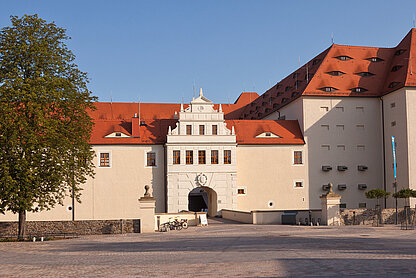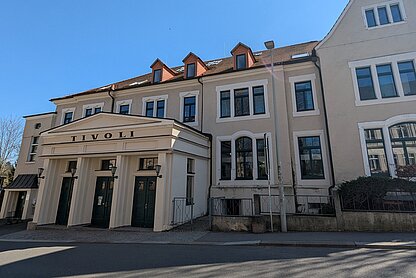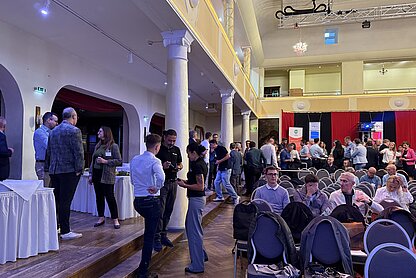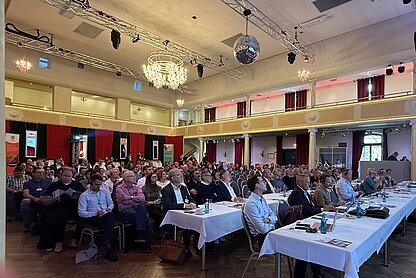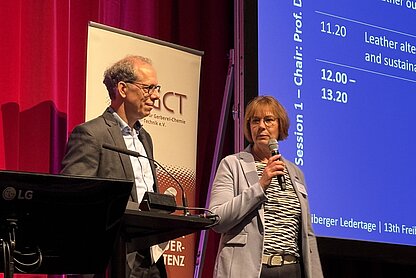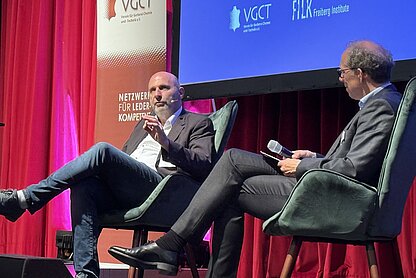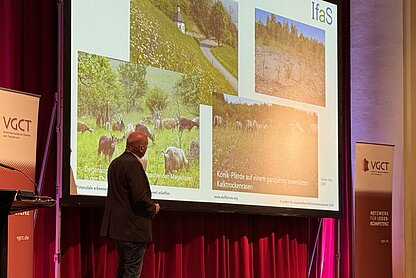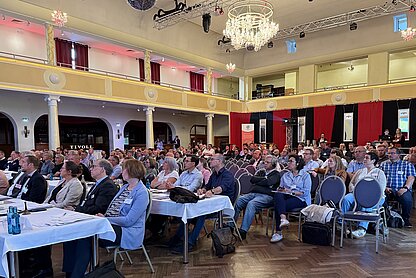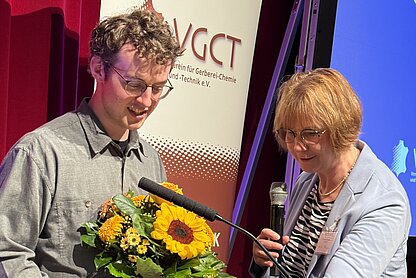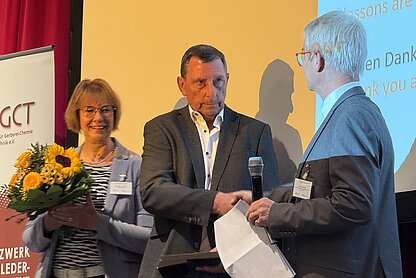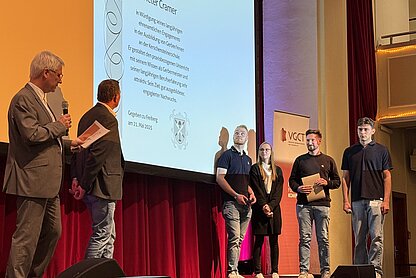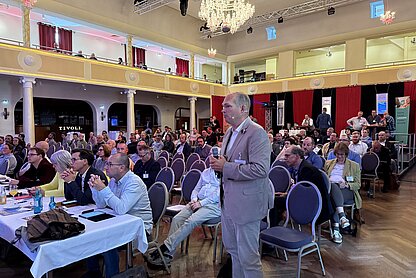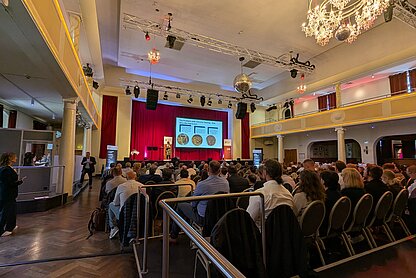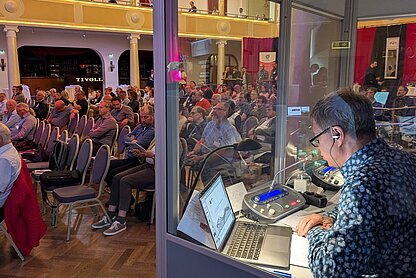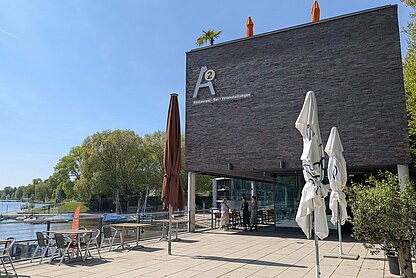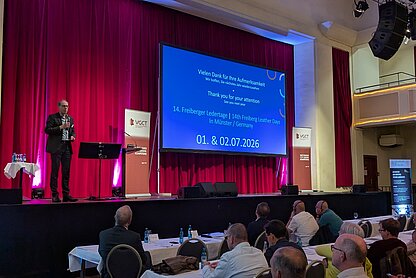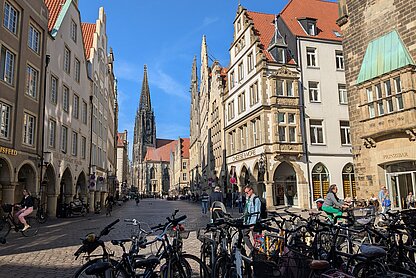13th Freiberg Leather Days on 21 and 22 May 2025 back in Freiberg
On May 21 and 22, 2025, the 13th Freiberg Leather Festival took place at the historic Tivoli Ballhaus in Freiberg. With almost 180 participants from 15 nations, this year's conference was more international and well-attended than ever before. Guests from Ethiopia, Australia, France, Great Britain, India, Italy, New Zealand, the Netherlands, Austria, Poland, Portugal, Romania, Switzerland, Slovakia, Spain, Tanzania, and, of course, from all over Germany, made the event a lively forum for exchange and networking.
The Tivoli provided the perfect backdrop: Since 1902, it has stood for diversity, transforming over the decades from a ballroom with dance, banquet, or theatre seating, to a discotheque, rock palace, and now a modern conference hall. Last but not least, the legendary East German rock band Puhdys even dedicated a song to the venue, "Im Tivoli."
Day 1 – Social debate and bio-based innovations
Following the official welcome address by Dr. Kerstin Schulte, Chair of the VGCT and co-organizer of the Leather Days, and Prof. Dr. Michael Meyer, Scientific Director at the FILK Freiberg Institute, Prof. Dr. Peter Heck (Trier University of Applied Sciences) opened the conference with his keynote speech, "Livestock as a Value-Creating Component in Regional Material Flow Management." He then discussed the role of livestock in a sustainable circular economy with Prof. Meyer.
The morning session addressed burning issues from the public debate:
Andreas Meyer (VDL) posed the provocative question, "Is leather out of date?"
Dr. Sascha Dietrich and Dr. Anke Mondschein (FILK) examined the performance and sustainability of leather alternatives.
The afternoon focused on concrete research results and innovations:
Dr. Ivo Reetz (Pulcra Chemicals) presented bio-based emulsifiers.
Cecilia China Rolence (NM-AIST, Tanzania) reported on the scaling of tanning agents from cashew shells.
Dr. André Derksen (Stahl International) presented novel polycarbodiimide crosslinkers.
Mishamo Wakaso Wajino (Addis Ababa University, Ethiopia) analyzed the sustainability challenges of the Ethiopian leather industry.
Dr. Jens Fennen (TFL France) demonstrated the potential of lignocellulose-based leather additives.
Keynote: Livestock as a value-adding component in regional material flow management
At the kickoff of the 2025 Leather Days, Prof. Dr. Peter Heck presented an innovative concept that rethinks the role of farm animals: Instead of viewing them solely as part of industrial meat production, Heck sees them as valuable players in regional material flow management. In his keynote speech, he demonstrated how animals can contribute to the maintenance and preservation of diverse cultural landscapes – for example, through grazing on moorland, low-nutrient grassland, or wet grassland. This form of land use not only promotes biodiversity and climate protection, but also creates new economic prospects for rural regions.
Heck advocated for a multifunctional use of land that combines traditional animal husbandry – from sheep to water buffalo – with modern ecological and economic requirements. According to Heck, agroforestry systems, near-natural grazing systems, and regional marketing concepts offer a sustainable alternative to conventional agriculture. This not only creates healthy food but also provides new impetus for the bioeconomy and the preservation of culturally evolved landscapes.
His conclusion: Site-adapted livestock farming is not a relic of the past, but a forward-looking building block for resilient regions and a sustainable economy.
The VGCT award ceremonies
A highlight of the first day was the ceremonial presentation of the VGCT awards:
The sponsorship award went to Tim Niedermayer, top student in his year in the leather production and tanning technology training program, which he successfully completed at Gmelich + Söhne GmbH.
The VGCT annual award was presented to Dieter Cramer. After 45 years as a tanner, he has been volunteering at the Kerschensteiner School in Reutlingen since 2021, where he helps shape the practice-oriented tanning technology curriculum. With his experience as a master tanner, he imparts valuable knowledge, motivation, and a solid foundation for their professional lives.
The laudatory speech was given by Andreas Meyer (VDL), who praised Dieter Cramer as a passionate instructor who supports young talent with expertise, humor, and commitment.
An evening together
After the VGCT general meeting and to conclude the first day, the group enjoyed a guided tour of the cathedral and dinner at the Freiberger Brauhof. A perfect opportunity to end the evening with professional and personal exchange.
Day 2 – Pollutants, automation and analytics
Day two opened with a session on the ever-moving target of pollutants, limit values, and legal requirements.
Dr. Riccardo Pasquale (GSC Group, IT) presented bisphenol-S-free syntans.
Dr. Nadja Dittrich (FILK) provided insights into new methods for chromium(VI) determination.
Dr. Thomas Martin (BG RCI) provided information on changes to the 2024 Hazardous Substances Ordinance.
This was followed by a strong session on international mechanical engineering and automation. AI-supported processes, in particular, can unlock enormous efficiency and quality potential.
Erik Heller (SLCR Lasertechnik) emphasized animal welfare as a guarantee of quality.
Marc Oomens (im | innovating, NL) presented new developments in leather sanding.
Laura Caccia (Mindhive Global, New Zealand) and Maximilian Wohlschläger (Dr. Schenk GmbH) presented AI-supported sorting and inspection systems.
Corrado Capolupi (Brevetti CEA, IT) and Christoph Hamacher (Lectra, FR) demonstrated automation solutions for wet processes and cutting.
The final part of the session was dedicated to analytics:
Dr. Anke Mondschein (FILK) reported on new findings on vegetable tanning agents.
Dr. Jochen Ammenn (Stahl) presented a robust method for measuring melamine.
Steffen Kohl (Smit & Zoon) presented climate chamber tests on zeologically tanned leather.
Dr. Stephen Mee (Devro, UK) examined thermal analyses of collagen.
Marcus Khalil (HOMIRO Metrology) bridged the gap between state-of-the-art metrology and traditional craftsmanship.
What remains and what comes
The 13th Freiberg Leather Days impressively demonstrated how the industry navigates the tension between tradition and innovation. Issues relating to the social acceptance of leather were discussed as intensively as concrete technological solutions for a sustainable future. With almost 180 participants, over 30 top-class speakers, and a venue steeped in tradition, the conference offered an exceptional platform for exchange, networking, and new ideas.
Preparations for the next conference are already in full swing: The 14th Leather Days will take place in Münster on July 1 and 2, 2026 – we are already looking forward to seeing you again!

